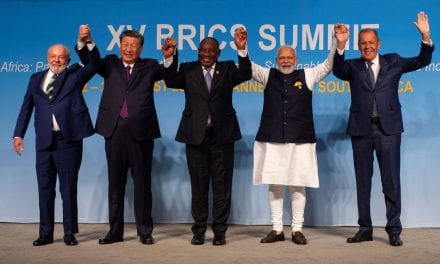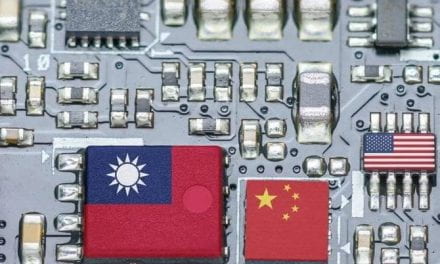By: Jason Wolf*
Over the course of his historic and electrifying 2016 Presidential Campaign, Donald Trump rallied the masses by pledging to put “America First”. Such a platform shocked U.S. allies, with some wondering whether or not the U.S. could be continued to be depended on. Only a couple months into his presidency, the practicality of Trump’s message is being tested by North Korea and their own polarizing leader, Kim Jung-Un. A pair of missile test launches from North Korea into the Sea of Japan, first on February 12th and then again on March 6th, has threatened Japan, a longtime U.S. ally, and brought about the first foreign policy challenge to the platform of nationalism that propelled Trump to the presidency. Given President Trump’s campaign rhetoric, the timing of the February 12th missile test, and the implications of the tests’ success, it is necessary for Donald Trump to disregard his campaign platform and follow a more traditional foreign policy by continuing the U.S.’s support of Japan in order to inhibit North Korea’s growing potential as a threat.
To understand why Trump must continue the U.S. policy of supporting Japan, it is necessary to understand the gravity of North Korea’s actions. The missile test from February 12th represents a military breakthrough for North Korea, as it was their first successful launching of an intermediate range missile with the capacity to carry a nuclear warhead.[1] The second test from March 6th raised the bar even higher, as North Korea successfully launched four intermediate range missiles, with three going so far as to encroach upon Japan’s exclusive economic zone and landing only a couple hundred miles off of their coast.[2] Reaction from around the globe has been great alarm, with even the United Nations Security Council moving swiftly to cite the February 12th test as a violation of a plethora of UN resolutions and to announce their condemnation of North Korea’s actions.[3] Such an urgent reaction from the UN highlights the increasing threat being posed by North Korea, as they are increasing their capacity to destabilize the Pacific Region.
While North Korea was working on increasing their military capabilities within their region, Donald Trump was floating the idea of withdrawing the U.S.’s presence from it. Throughout the months leading up to the election, Donald Trump flaunted a nationalistic approach to foreign policy designed to put “America First.” This type of policy sparked controversy among the U.S.’s Pacific allies, as Trump emphasized the need for states such as Japan and South Korea to contribute more towards their own defense in order to maintain the support provided by the U.S.[4] This type of insistence from Trump is significant as it highlights his perception of the need for the U.S. to reprioritize their spending habits abroad, even in the face of North Korean aggression towards these particular allies.
Interestingly, Trump displayed great awareness of North Korea’s increasing threat in an April 2016 speech on foreign policy. Specifically, he identified North Korea’s growing aggression and their nuclear program, while criticizing President Obama as being overly timid in reacting to it and for not lobbying China hard enough to quell it.[5] Having made these remarks following his previous assertion that the U.S. may deprioritize the protection of our Pacific allies, there was the implication that such a reallocation of American resources would create a window of opportunity for North Korea to shake up the status quo.
Trump’s popular “America First” campaign rhetoric is ironic when one examines the timing of North Korea’s February 12th test. Over the course of the weekend that North Korea tested the missile, President Trump was hosting Japanese Prime Minister Shinzo Abe on a visit to the United States. In a statement, Abe labeled the test as “intolerable.” Japan’s chief Cabinet secretary, Yoshihide Suga further elaborated upon the test by citing the timing as coming during a meeting between Abe and Trump as being a provocation to Japan and their neighbors.[6] Suga’s interpretation is significant in how it highlights the symbolic nature of the timing of the test, with North Korea using the missile launch as a test of President Trump’s resolve to either reaffirm his campaign rhetoric towards Japan, or to reconsider and continue the U.S.’s support of Japan. At a joint press conference with his Japanese counterpart, President Trump pledged support towards Japan, thereby appearing to prefer to follow the traditional U.S. foreign policy in this regard.[7] In reaffirming the U.S.’s support of Japan, however, President Trump showed that he is willing to be flexible with his foreign policy, especially given the circumstances regarding his diplomacy.
While North Korea’s actions served as a test of not only their newfound missile capabilities, but also of Trump’s foreign policy, it is important to note the implications of them doing so. With the missile having the capacity for intercontinental range, the possibility exists that North Korea is beginning to develop the capability to potentially strike at the United States.[8] Such a scenario would be extremely unsettling, as there is a long history of tensions between the U.S. and North Korea dating back to the U.S.’s involvement in the unfinished Korean War that was only halted by a ceasefire. The March 6th test represents not only a further increase in capabilities, but also the quick turnaround between the tests signifies North Korea’s increased urgency towards production.[9] To avoid what could be calamitous fallout from a further escalation of tension from an unchecked North Korea, President Trump needs to continue to reinforce the U.S.’s support for Japan in order to maintain a strong military presence within the region. Furthermore, Trump must take his own advice and seek out support from China in helping to restrain North Korea’s aggression.
North Korea’s missile tests were not only designed to showcase their newfound military capabilities, but also as a test of President Trump’s “America First” rhetoric. Trump’s attitude whilst on the campaign, the critical timing of the February 12th test, and the potential fallout of further North Korean military successes make this test a crucial one in displaying President Trump’s actual foreign policy. While Trump’s attitude pre-inauguration may have given North Korea the confidence to attempt to disrupt the status quo, relying on allies within the region offers President Trump the best solution for restraining North Korea’s aggression and keeping them in check. Such a foreign policy is necessary, even at the cost of deviating from his “America First” message that struck such an emphatic chord with voters.
References
[1] Almasy, Steve, and Joshua Berlinger. “North Korea Calls Ballistic Missile Test-fire a Success.” CNN. Cable News Network, 13 Feb. 2017. Web. 21 Feb. 2017.
[2] Hancocks, Paula, and Ben Westcott. “North Korea Fires Four Ballistic Missiles.” CNN. Cable News Network, 6 Mar. 2017. Web. 13 Mar. 2017.
[3] “Security Council Press Statement on Democratic People’s Republic of Korea’s Ballistic Missile Launch | Meetings Coverage and Press Releases.”United Nations. United Nations, 13 Feb. 2017. Web. 21 Feb. 2017.
[4] Trump, Donald J. “Transcript: Donald Trump Expounds on His Foreign Policy Views.” The New York Times. The New York Times, 26 Mar. 2016. Web. 21 Feb. 2017.
[5] Trump, Donald J. “Transcript: Donald Trump’s Foreign Policy Speech.” The New York Times. The New York Times, 27 Apr. 2016. Web. 21 Feb. 2017.
[6] Almasy, Steve, and Joshua Berlinger. “North Korea Calls Ballistic Missile Test-fire a Success.” CNN. Cable News Network, 13 Feb. 2017. Web. 21 Feb. 2017.
[7] Almasy, Steve, and Joshua Berlinger. “North Korea Calls Ballistic Missile Test-fire a Success.” CNN. Cable News Network, 13 Feb. 2017. Web. 21 Feb. 2017.
[8] Sang-hun, Choe. “North Korea Fires Ballistic Missile, Challenging Trump.” The New York Times. The New York Times, 11 Feb. 2017. Web. 21 Feb. 2017.
[9] Hancocks, Paula, and Ben Westcott. “North Korea Fires Four Ballistic Missiles.” CNN. Cable News Network, 6 Mar. 2017. Web. 13 Mar. 2017.
*Disclaimer: The content contained in the following material is the sole ownership of the author and does not reflect the views of the Towson University Journal of International Affairs nor Towson University in any respect whatsoever







